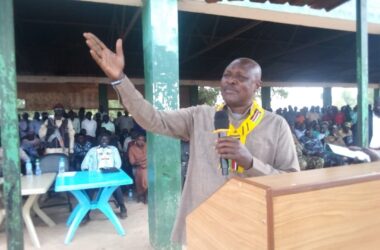By Bida Elly David
At least three police officers were injured in a protest by street vendors in Custom Market over the weekend.
The incident occurred after Central Equatoria State government in collaboration with the city council, carried out an eviction exercise of street vendors, to improve the internal roads in Juba.
The eviction exercise, which happened on Friday last week, was accompanied by a compromise through the allocation of space for the dislodged retailers.
However, despite the compromise, the allocated marketplace was believed to have been unequally distributed to the retailers, which triggered the protest.
Maj. Gen.Daniel Justine, the national police spokesperson, told No. 1. Citizen Daily newspaper on Sunday, that the officers faced tragedy while restoring calm during the protest.
He revealed that the protest was started by some vendors who failed to secure a place after registration had already taken place.
“Three soldiers were wounded, two police officers and one from national security during the protest and they were rushed for treatment,’’ Justine said
Ge. Justine mentioned that the market spaces were distributed on Saturday, and during the allocation, some names did not appear.
“Those whose names were not there tried to cause problems, throwing stones against themselves and then turned on the officers,” he said.
The spokesperson also noted that the angry vendors turned a deaf ear to the authorities after they were told to wait until verification was done.
The city council in charge of the distribution tried to have a communique with the angry vendors, but it never worked until the authority took steps.
“We told them to wait until verification is done but they went into the market marching then some of them started throwing stones on the officials in charge of the organization,” he echoed.
Justine, however, failed to mention the statistics of vendors who were injured during the market protest.
He mentioned that the police are still waiting for the resolution of the meeting from the stakeholders, after which they will act according to the cause and how best the issue can be addressed.
Joyce Kiden, a cloth vendor, who failed to secure a space, blamed the committee in charge of registration, stating that the selection of people was not technical but done according to their choice and financial powers.
She added that there are very many of them who requested a space but were not recognized.
“I am now operating in a squeezed and narrow space that I am not even allowed, most of us promised not to desist protest until we are offered spaces because we are working for our families,’’ she reacted.
Many of them were angry and protested against the discrimination, she said.
Kiden stated that the business environment during the protest was unfriendly, and they decided to close the business to claim their rights.
Albino Alier, a barrow boy, said that they even attempted to re-occupy the streets again due to the ongoing discrimination played by the city council and the distribution team.
He described the allocation discrimination as technical know-how, not how due to registration of who they know best.
“If they fail to find us a space, we will not hesitate to shift back to the vacated spaces along the streets until they secure us a free space to run our enterprises,” he said.
The director general of the Munuki bloc last week promised fair allocation of the market space to every evicted vendor, saying that each vendor would be allocated two and a half meters of tokens within the space.
Over 200 retailers already registered.



